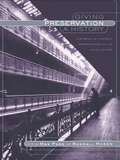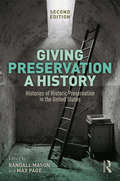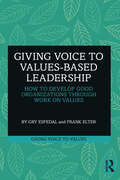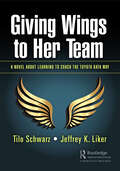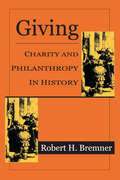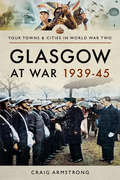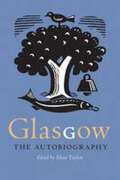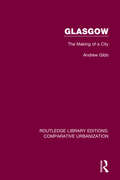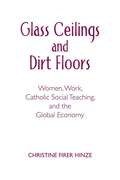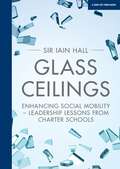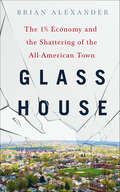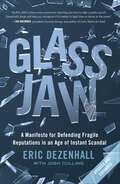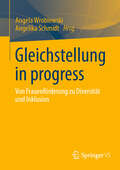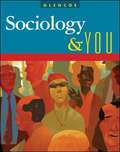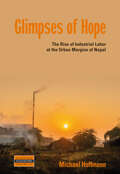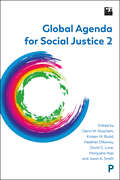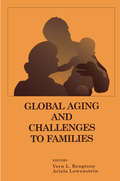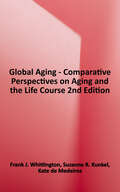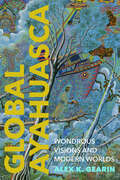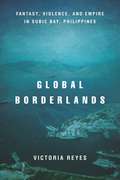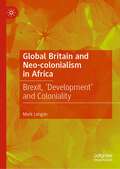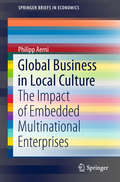- Table View
- List View
Giving Preservation a History
by Randall Mason Max PageIn this volume, some of the best figures in the field have come together to write on preservation movements across the country, from New York to Atlanta to Santa Fe and others. Giving Preservation a History also touches on the European roots of the historic preservation movement; on how preservation movements have taken a leading role in shaping American urban space and urban development; how historic preservation battles have reflected broader social forces; and what the changing nature of historic preservation means for the effort to preserve the nation's past.
Giving Preservation a History: Histories of Historic Preservation in the United States
by Randall Mason Max PageIn this volume, some of the leading figures in the field have been brought together to write on the roots of the historic preservation movement in the United States, ranging from New York to Santa Fe, Charleston to Chicago. Giving Preservation a History explores the long history of historic preservation; how preservation movements have taken a leading role in shaping American urban space and development; how historic preservation battles have reflected broader social forces; and what the changing nature of historic preservation means for efforts to preserve national, urban and local heritage. The second edition adds several new essays addressing key developing areas in the field by major new voices. The new essays represent the broadening range of scholarship on historic preservation generated since the publication of the first edition, taking better account of the role of cultural diversity and difference within the field while exploring the connections between preservation and allied concerns such as environmental sustainability, LGBTQ and nonwhite identity, and economic development.
Giving Voice to Values-based Leadership: How to Develop Good Organizations Through Work on Values (Giving Voice to Values)
by Gry Espedal Frank ElterThe complexity facing today’s organizations calls for a rethinking of leadership. The world is facing grand challenges for people and the planet. Leaders and employees bear the responsibility of formulating strategies grounded in strong values. These strategies aim to foster the growth of sustainable organizations and promote ethical work practices. This book gives voice to values-based leadership and provides a method for leaders to develop a values-based organizational culture. Values play a role on many levels in how we work as individual leaders, in teams, and in organizations and in how organizations approach societal challenges. Values can be a compass or orientation point, giving direction for decisions and actions. Awareness of values can make organizational responsibilities clearer and give a sense of meaning to work and help leaders to create organizations where corporate, moral, and social values are embedded at every level. This book gives insight into a Scandinavian values-based leadership model built on the institutional leadership tradition. It provides processes and practices that leaders can use to develop organizations where values are continuously nurtured. The book provides practical ideas of how leaders can work on becoming conscious of both the organization’s explicit and implicit values, as well as working on the direction of the organization and its broader organizational culture. This book will be an invaluable resource for both practitioners and graduate students interested in leadership and organizational development.
Giving Wings to Her Team: A Novel About Learning to Coach the Toyota Kata Way
by Jeffrey K. Liker Tilo SchwarzDenise dreamed of being the kind of leader who empowered and engaged her people, but was becoming frustrated and disillusioned. Denise -- a fast-rising, young consultant at a large advisory firm -- lands a job as a manager in industry. Crisis strikes as low-cost competitors take market share and general chaos generates late shipments. Denise goes into Lean consulting mode but quickly learns her supervisors are not buying it. They're not engaged, and they find the Lean tools confusing and a distraction from their goals of getting product out. It's going to take some magic -- magic that's available to you, the reader, too! Come with Denise on a journey of discovery and skill development, as she moves beyond the tools and concepts of Lean and focuses on daily practice that helps her supervisors achieve their goals. It's about an approach called Toyota Kata that helps anyone develop and apply scientific thinking -- an exploratory mindset of curiosity and experimentation. A mentor from an unlikely place appears and shares with Denise how to coach her team. Once her supervisors dig into real problems they face every day, they begin to engage. Step by step, with insightful inputs from her mentor, Denise starts developing the skills to become a coaching manager. She watches her team meet their current challenges and be ready for more. When you teach and practice scientific thinking and coaching skills you give wings to your team, and new worlds of opportunity open up. If you're a manager you'll identify with how the team in this story goes beyond general preaching about best practices, to practicing how to get to where they want to be. If you're a Lean practitioner frustrated with applying tools with a limited half life, you'll learn how to develop people so they can achieve their most important goals and keep going. And if you're already a Toyota Kata practitioner, well ... you will love this book!
Giving: Charity and Philanthropy in History
by Robert H. Bremner"According to Greek mythology mankind's first benefactor was the Titan, Prometheus, who gave fire, previously the exclusive possession of the gods, to mortal man." With these words the esteemed scholar Robert Bremner presents the first full-fledged history of attitudes toward charity and philanthropy. 'Giving' is a perfect complement to his earlier work The Discovery of Poverty in the United States. The word 'philanthropy' has been translated in a variety of ways: as a loving human disposition, loving kindness, love of mankind, charity, fostering mortal man, championing mankind, and helping people. Bremner's book covers all of these meanings in rich detail. Bremner describes the ancient world and classical attitudes toward giving and begging; Middle Ages and early modern times, emphasizing hospitals and patients and donors and attributes of charity; the eighteenth century and the age of benevolence; the nineteenth century and the growth of the concept of public relief and social policy; and a careful multiple chapter review of the twentieth century. Bremner reviews the act of giving in such comparative contexts as London, England and Kasrilevke, Russia with such figures as Thomas Carlyle, Charles Dickens, and Sholem Aleichem, as well as the more familiar wealthy industrialist/philanthropists, forming part of the narrative. The final chapters bring the story up to date, discussing the relationships of modem philanthropy and organized charity, and the uses of philanthropy in education and the arts. Bremner has an astonishing knowledge of the cultural context and the economic contents of philanthropy. As a result, this volume is intriguing as well as important history, written with lively style and wit. Whether the reader is a professional in the so-called "third stream" or "independent sector," or simply a citizen wondering just what the act of giving and the spirit of receiving is all about, 'Giving' will be compelling reading.
Glasgow at War, 1939–45 (Your Towns & Cities in World War Two)
by Craig ArmstrongAn in-depth look at how Scotland&’s largest city and its residents were affected by the Second World War, with photos included. Scotland was of grave strategic importance during World War II because of its geographical position, and Glasgow was the location of a significant number of important military and civil organizations as well as housing industry vital to the national war effort. As a result, Glasgow attracted enemy attention on many occasions—with the city and its hinterland being heavily raided by the Luftwaffe. These included the infamous raid on Clydebank in March 1941, which killed over five hundred civilians and left only seven houses undamaged in the town. Although Glasgow&’s shipyards, munitions factories, and other industries were all vital, so too was the location of the city itself. The River Clyde was the end point for many Atlantic convoys bringing precious food, material, and men to the war-struck British Isles, and the city was thus a vital link in the nation&’s war effort. No member of the population of Glasgow escaped the war. Huge numbers of men and women from the area came forward for service in the military or in roles involving the Home Guard, ARP services, nursing, and vital war industries. Residents struggled to maintain a household under strict rationing and the stresses of wartime life, and children were evacuated from the city to rural areas to escape the bombing campaigns. Glasgow was also home to a sizable Italian community, which was badly affected by internment and tight restrictions on movement and civil rights. The Italian community was also subjected to violent attacks when rioting mobs attacked Italian-owned business throughout the city. Glasgow at War 1939-1945 paints a portrait of a city fighting to survive, and poignantly commemorates the efforts and achievements of workers, fighters, and families divided.
Glasgow: The Autobiography
by Alan TaylorThe story of a Scottish city as seen by its residents and visitors: &“It&’s a fine treasure-house—and even Glaswegians may learn something new from it.&” —Scotsman This is the story of the fabled former Second City of the British Empire, from its origins as a bucolic village on the rivers Kelvin and Clyde, through the Industrial Revolution to the dawning of the second millennium. Arranged chronologically and introduced by journalist and Glasgowphile Alan Taylor, the book includes extracts from an astonishing array of writers. Some, such as William and Dorothy Wordsworth, Dirk Bogarde, and Evelyn Waugh, were visitors and left their vivid impressions as they passed through. Many others were born and bred Glaswegians who knew the city and its inhabitants—and its secrets—intimately. They come from every walk of life and, in addition to professional writers, include anthropologists and scientists, artists and murderers, housewives and hacks, footballers and comedians, politicians and entrepreneurs, immigrants and locals. Together they present a varied and vivid portrait of one of the world&’s great cities in all its grime and glory—a place at once infuriating, frustrating, inspiring, beguiling, sensational, and never, ever dull.
Glasgow: The Making of a City
by Andrew GibbOriginally published in 1983, this book sets the phases and elements of Glasgow’s townscape evolution in their historical framework, from the medieval period when Glasgow was a small but important burgh to the growth of the town thanks to its command of the transatlantic tobacco trade in the 18th Century. Examining the solid growth which came with the textile phase of the industrial revolution and subsequent pioneering achievements in ship-building and marine engineering, the book also charts the subsequent collapse of the industrial base and attempts at urban renewal on a massive scale.
Glass Ceilings And Dirt Floors: Women, Work, And The Global Economy
by Christine Firer HinzeToday's market economy depends upon, yet undervalues, the essential contributions of households to the care work that makes all other work possible. As designated tenders of the care economy, women take daily, costly responsibility for a fundamental fact that mainstream economics underplays or conceals, market economy depends continuously on another economy, wherein our embodied vulnerabilities are respected and addressed by way of caring labor and relationships. In this compelling expose on the (in)justice of women's work, Christine Firer Hinze argues for re-prioritizing the holistic understanding of economy as oikonomia-literally, the management of a household in order to sustainably provide for all members-assumed in traditional classical, and contemporary political economics. This oikos-focused paradigm addresses global work-family struggles at their roots by shifting the axis of our economic imaginations, values, and policy making from a marketized-competitive model to one that prioritizes economy's inclusive, provisioning purposes. Following several years of working in inner-city ministry and teaching high school in Detroit, Christine Firer Hinze received a PhD in Christian social ethics from the University of Chicago Divinity School. Her research and teaching focus on Catholic social and economic ethics, women and work, and power and social transformation. Book jacket.
Glass Ceilings: Enhancing Social Mobility: Leadership Lessons From Charter Schools
by Iain HallAfter a Damascene moment following a school trip to the US, Sir Iain Hall realised the UK's approach to urban education is all wrong. In Glass Ceilings, the hugely experienced and respected educator lays out his vision to get social mobility moving again in the UK.
Glass Ceilings: Enhancing Social Mobility: Leadership Lessons From Charter Schools
by Iain HallAfter a Damascene moment following a school trip to the US, Sir Iain Hall realised the UK's approach to urban education is all wrong. In Glass Ceilings, the hugely experienced and respected educator lays out his vision to get social mobility moving again in the UK.
Glass House: The 1% Economy and the Shattering of the All-American Town
by Brian AlexanderFor readers of Hillbilly Elegy and Strangers in Their Own LandWINNER OF THE OHIOANA BOOK AWARDS AND FINALIST FOR THE 87TH CALIFORNIA BOOK AWARDS |NAMED A BEST/MOST ANTICIPATED BOOK OF 2017 BY: New York Post • Newsweek • The Week • Bustle • Books by the Banks Book Festival • Bookauthority.comThe Wall Street Journal: "A devastating portrait...For anyone wondering why swing-state America voted against the establishment in 2016, Mr. Alexander supplies plenty of answers." Laura Miller, Slate: "This book hunts bigger game.Reads like an odd?and oddly satisfying?fusion of George Packer’s The Unwinding and one of Michael Lewis’ real-life financial thrillers."The New Yorker : "Does a remarkable job." Beth Macy, author of Factory Man: "This book should be required reading for people trying to understand Trumpism, inequality, and the sad state of a needlessly wrecked rural America. I wish I had written it." In 1947, Forbes magazine declared Lancaster, Ohio the epitome of the all-American town. Today it is damaged, discouraged, and fighting for its future. In Glass House, journalist Brian Alexander uses the story of one town to show how seeds sown 35 years ago have sprouted to give us Trumpism, inequality, and an eroding national cohesion.The Anchor Hocking Glass Company, once the world’s largest maker of glass tableware, was the base on which Lancaster’s society was built. As Glass House unfolds, bankruptcy looms. With access to the company and its leaders, and Lancaster’s citizens, Alexander shows how financial engineering took hold in the 1980s, accelerated in the 21st Century, and wrecked the company. We follow CEO Sam Solomon, an African-American leading the nearly all-white town’s biggest private employer, as he tries to rescue the company from the New York private equity firm that hired him. Meanwhile, Alexander goes behind the scenes, entwined with the lives of residents as they wrestle with heroin, politics, high-interest lenders, low wage jobs, technology, and the new demands of American life: people like Brian Gossett, the fourth generation to work at Anchor Hocking; Joe Piccolo, first-time director of the annual music festival who discovers the town relies on him, and it, for salvation; Jason Roach, who police believed may have been Lancaster’s biggest drug dealer; and Eric Brown, a local football hero-turned-cop who comes to realize that he can never arrest Lancaster’s real problems.
Glass Jaw: A Manifesto For Defending Fragile Reputations In An Age Of Instant Scandal
by Eric DezenhallIn an age when scandal can destroy a company's brand or anyone's reputation in an instant-GLASS JAW is an Art of War guide to modern crisis management. In boxing terms, a tough-looking fighter who can't take a punch is said to have a "glass jaw," and so it is these days with targets of controversy. Down the rabbit hole of scandal, the weak are strong and the strong are weak. Just consider this slate of recent reputational body blows: Toyota, Susan G. Komen, Paula Deen, Tiger Woods, Joe Paterno, BP, the Duke Lacrosse players, Lance Armstrong, and Anthony Weiner. GLASS JAW is a manifesto for these times, written by crisis management veteran Eric Dezenhall, who has spent three decades dealing with some of the most intense controversies, both known and . . . handled with discretion. In the current digital age, the fundamental nature of controversy is viral, rendering once-mighty organizations and individuals powerless against scandal. In GLASS JAW, Dezenhall analyzes scandal and demystifies the paper tiger "spin" industry, offering lessons, corrective measures, and counterintuitive insights, such as: How there really is no "getting ahead" of a bad story (and other clichés from the media) The perils of navigating the "Fiasco Vortex" The art (and transaction) of the public apology Why a crisis is not an opportunity The Nixon Fallacy: if only he had just said "I screwed up," the whole thing would have gone away (not a chance) How you are the enemy: the self-sabotage of selfies, tweets, emailing before thinking, technology creep, the privacy vacuum, and the industrialization of leaking. From the boardroom to the parenting messaging board, scandals erupt every day. GLASS JAW explains this changing nature of controversy and offers readers counterpunches to best protect themselves.
Gleichheit, Politik und Polizei: Jacques Rancière und die Sozialwissenschaften
by Thomas Linpinsel Il-Tschung LimJacques Rancière gilt als einer der einflussreichsten französischen Philosophen der Gegenwart, in dessen gesamtem Werk immer wieder das Motiv der radikalen Kritik an der Sozialwissenschaft in Szene gesetzt wird. In dem Sammelband werden zahlreiche Denkmotive des französischen Philosophen aus einer genuin sozialwissenschaftlichen Perspektive aufgegriffen, weitergedacht und kritisiert, wobei in den einzelnen Artikeln konkrete Forschungsperspektiven mit Rancière entwickelt, methodologische Überlegungen im Anschluss an Rancière vorgestellt, gesellschaftstheoretische Reflexionen vor dem Hintergrund der Kritik des Philosophen unternommen sowie Aspekte seines politischen Denkens in die politische Theorie integriert werden. Aber auch sozialwissenschaftliche Kritik an der Philosophie Rancières findet in den Argumentationen der Autorinnen und Autoren ihren Platz. Somit bietet der Band ein breit gefächertes Spektrum an sozialwissenschaftlichen Anschlüssen an das Denken des französischen Philosophen. Einerseits schließt der Sammelband damit eine Lücke in der sozialwissenschaftlichen Forschung und ist anderseits der erste genuin sozialwissenschaftliche Beitrag in der umfangreichen jüngeren Forschung zum philosophischen Werk Rancières.
Gleichstellung in progress: Von Frauenförderung zu Diversität und Inklusion
by Angela Wroblewski Angelika SchmidtDer Band thematisiert aktuelle Herausforderungen für Gleichstellungspolitik und die notwendige Weiterentwicklung gleichstellungspolitischer Konzepte, um Exklusionsmechanismen effektiv adressieren zu können. Die Beiträge diskutieren dies an der Schnittstelle zwischen Forschung und Politik sowie anhand konkreter Beispiele.
Gleichstellungspolitiken revisted: Zeitgemäße Gleichstellungspolitik an der Schnittstelle zwischen Politik, Theorie und Praxis
by Angela Wroblewski Angelika SchmidtAnfang der 1990er Jahre wurde erstmals von einem Backlash im Bereich der Frauenförderung und Gleichstellung gesprochen und die Strategien des Patriachats aufgezeigt, die den Forderungen von Frauen* nach gleichberechtigter Teilhabe entgegengesetzt werden. Aktuell wird wieder – nicht nur in Österreich – von einem Backlash gesprochen, der sich beispielsweise in einer Abkehr von der geschlechtsneutralen Sprache, in der Kürzung von Subventionen für Frauen- und Mädchenberatungseinrichtungen, im Rückbau von Institutionen und in Angriffen auf die Gender Studies niederschlägt. Zu diesen Phänomenen von Backlash kam es trotz der Etablierung zahlreicher Institutionen im Bereich Gleichstellung und Bekenntnisse zur Förderung von Vielfalt auf politischer Ebene und von Unternehmensseite. Ausgehend von diesem ambivalenten Befund zum Status Quo von Gleichstellung werden Anforderungen an eine zeitgemäße Gleichstellungspolitik an der Schnittstelle zwischen Politik, Theorie und Praxis formuliert. Die Beiträge in dem Band zeigen aktuelle Herausforderungen für Gleichstellungspolitik und illustrieren, wie die Schnittstelle ausgestaltet werden kann.
Glencoe Sociology & You
by Jon M. Shepard Robert W. GreeneA sociology program written exclusively for high school students Sociology and Youis written by successful authors with extensive experience in the field of sociology. MeetAmerican Sociological Association standardsfor the teaching of sociology in high school with this comprehensive program.
Glimpses of Hope: The Rise of Industrial Labor at the Urban Margins of Nepal (Dislocations #32)
by Michael HoffmannOver the last decade, Nepal has witnessed significant urban growth and an expanding urban middle class. Glimpses of Hope tells the story of the people who enable some of the middle-class consumer practices in urban Nepal. The book focuses on workers in areas such as modern food-processing, water-bottling, housebuilding, and sand-mining industries and explores how workers see such forms of work, where union organization can help, and how work opportunities emerge along lines of gender and ethnicity. Although global labor relations have been mostly in decline for decades, this ethnography offers insights and glimpses of hope in terms of labor dynamics and the opportunities various jobs may afford.
Global Agenda for Social Justice 2: Volume 2: Global Perspectives (SSSP Agendas for Social Justice)
by Glenn W. Muschert, Kristen M. Budd Heather Dillaway, David C. Lane Manjusha Nair, and Jason A. SmithThe Global Agenda for Social Justice provides accessible insights into some of the world’s most pressing social problems and proposes practicable international public policy responses to those problems. Written by a highly respected team of authors brought together by the Society for the Study of Social Problems (SSSP), chapters examine topics such as education, violence, discrimination, substance abuse, public health, and environment. The volume provides recommendations for action by governing officials, policy makers, and the public around key issues of social justice. The book will be of interest to scholars, practitioners, advocates, journalists, and students interested in public sociology, the study of social problems, and the pursuit of social justice.
Global Aging and Challenges to Families
by Vern L. BengtsonThe recent explosion in population ageing across the globe represents one of the most remarkable demographic changes in human history. Population ageing will profoundly affect families. Who will care for the growing numbers of tomorrows very old members of societies? Will it be state governments? The aged themselves? Their families? The purpose of this book is to examine consequences of global aging for families and intergenerational support, and for nations as they plan for the future.
Global Aging: Comparative Perspectives on Aging and the Life Course, 2nd Edition
by Frank J. Whittington Kate De Medeiros Suzanne R. KunkelPraise for the first edition: “This book is exemplary in amassing demographic, policy, and sociopsychological data from around the world… The content of the book is rich with current information seldom accumulated into one source recommend this volume to gerontologists, aging studies undergraduate and graduate students… demographers, and global studies scholars.” Dr. Carol A. Gosselink, PsycCritiques Written by leading scholars, this esteemed text on global aging is distinguished by its unique perspective on universal similarities and sociocultural differences across nations. Fully revised, updated, and reorganized, the second edition presents comprehensive coverage of major topics in social gerontology and expands its treatment of health behavior, health care, families, caregiving, older workers, and retirement. It delivers new information on living environments, religious beliefs and practices, environmental threats, cross-cultural views of dementia, ageism in advertising, age-friendly communities, global immigration and cultural assimilation, and end-of-life caregiving. The second edition also offers additional case studies, first-person narratives, and focused essays to enhance core material and include a greater number of non-Western contributors. The topical essays reflect changing mores and current issues affecting societies and the aging experience. Discussion questions conclude each chapter, and an Instructor’s Manual and PowerPoint slides are available to instructors. The print version of the book includes free, searchable, digital access to the entire contents. New to the Second Edition: - Expanded content on health beliefs and health behavior, religious belief and practice, environmental threats, housing and living environments, physical security, consumer control of health care, family life, and more - Additional topics on global immigration and cultural assimilation, age portrayals in advertising, voluntarism, and the use of social media in caregiving - Abundant new and expanded essays - New case studies and first-person narratives - Many more non-Western contributors Key Features: - Delivers comprehensive coverage of major topics in gerontology - Uses a unique comparative, cross-national perspective - Authored by world-renowned aging scholars - Includes case studies/essays/personal narratives to enliven core information - Provides the most comprehensive demographic data on aging around the world
Global Ayahuasca: Wondrous Visions and Modern Worlds (Spiritual Phenomena)
by Alex K. GearinCeremonies of drinking the psychoactive brew ayahuasca have flourished across the planet in recent decades. Emerging from Indigenous roots in the Amazon rainforest, the brew is now envisaged by many as the spiritual gateway to archaic and primordial worlds, with reports of healing, spiritual insight, and awe-inspiring visions placing ayahuasca among the burgeoning field of psychedelic medicines. Astonished and allured by descriptions of ayahuasca experiences, researchers in psychology, anthropology, and philosophy have attempted to define the shared properties of the visions. In this book, Alex Gearin challenges this simplified obsession with universal truth and explores the embodied practices of contemporary ayahuasca drinkers to reveal how the brew has conjured contradictory experiences across the globe. These range from urban disenchantment and capitalist mastery to competitive sorcery and ecological harmony, wherein the plant-induced visions embody different attitudes towards capitalist modernity. Based upon ethnographic research among Shipibo healers in remote Peru, alternative medicine groups in urban Australia, and entrepreneurs and corporate managers in mainland China, Global Ayahuasca examines how the wondrous visions of ayahuasca are entangled within the social and economic realities that they illuminate, revealing different tensions, fears, and hopes of everyday modern life.
Global Borderlands: Fantasy, Violence, and Empire in Subic Bay, Philippines (Culture and Economic Life)
by Victoria ReyesThe U.S. military continues to be an overt presence in the Philippines, and a reminder of the country's colonial past. Using Subic Bay (a former U.S. military base, now a Freeport Zone) as a case study, Victoria Reyes argues that its defining feature is its ability to elicit multiple meanings. For some, it is a symbol of imperialism and inequality, while for others, it projects utopian visions of wealth and status. Drawing on archival and ethnographic data, Reyes describes the everyday experiences of people living and working in Subic Bay, and makes a case for critically examining similar spaces across the world. These foreign-controlled, semi-autonomous zones of international exchange are what she calls global borderlands. While they can take many forms, ranging from overseas military bases to tourist resorts, they all have key features in common. This new unit of globalization provides a window into broader economic and political relations, the consequences of legal ambiguity, and the continuously reimagined identities of the people living there. Rejecting colonialism as merely a historical backdrop, Reyes demonstrates how it is omnipresent in our modern world.
Global Britain and Neo-colonialism in Africa: Brexit, 'Development' and Coloniality
by Mark LanganThis book examines the implications of Brexit for Africa-UK relations amid a ‘new scramble’ for the continent. Engaging Nkrumah on neo-colonialism and recent scholarship on global coloniality, Langan here underscores concerns that Brexit was fuelled by an imperial romanticism that now gives rise to a Global Britain project involving the perpetration of ‘Empire 2.0’ in Africa. In this context, he examines UK elites’ pursuit of Brexit trade deals and the ‘development’ consequences of premature market opening. Throughout its chapters, this work assesses strategic usages of UK aid monies in terms of economic leverage and the externalisation of migration and highlights the impact of UK development finance and corporate activities for the health and wellbeing of workers and host communities. Significantly, Langan explores the UK’s pursuit of security interests and human rights criticisms and concludes by highlighting African agency to resist the Global Britain project amid the fragility of the British state itself.
Global Business in Local Culture: The Impact Of Embedded Multinational Enterprises (SpringerBriefs in Economics)
by Philipp AerniThis book examines the impact of multinational enterprises (MNEs) on local economies, and presents selected case studies of MNEs operating in low income countries. By balancing external social and environmental costs against its corresponding benefits, the book demonstrates that MNEs can have a positive net-impact on local development if they build up social capital by embedding themselves in local economies and engaging responsibly with local stakeholders. By doing so MNEs contribute to inclusive growth, a cental pillar of the UN Sustainable Development Goals. In this context, the book challenges popular narratives in civil society and academia that frame foreign direct investment (FDI) merely as a threat to human rights and sustainable development. Moreover, it offers practical guidance for globally operating businesses seeking to establish progressive Corporate Social Responsibility (CSR) strategies of their own.
